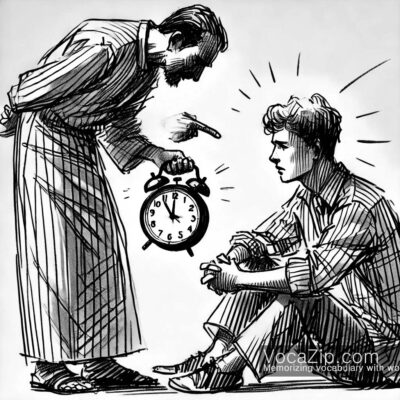curfew meaning
curfew :
Toque de queda, hora de llegada
Sustantivo
▪ The city imposed a curfew at 10 PM.
▪ La ciudad impuso un toque de queda a las 10 PM.
▪ Parents set a curfew for their children.
▪ Los padres establecen una hora de llegada para sus hijos.
paraphrasing
▪ restriction – restricción
▪ deadline – fecha límite
▪ regulation – regulación
▪ limitation – limitación

curfew :
Imponer un toque de queda
Verbo
▪ The government will curfew the city tonight.
▪ El gobierno impondrá un toque de queda en la ciudad esta noche.
▪ They decided to curfew the area due to unrest.
▪ Decidieron imponer un toque de queda en el área debido a disturbios.
paraphrasing
▪ restrict – restringir
▪ control – controlar
▪ enforce – hacer cumplir
▪ limit – limitar
Pronunciation
curfew [ˈkɜː.fjuː]
La palabra tiene el acento en la primera sílaba "cur", y se pronuncia como "kér-fiu".
Common phrases and grammar about curfew
curfew - Common meaningn
Sustantivo
Toque de queda, hora de llegada
Verbo
Imponer un toque de queda
Part of Speech Changes for curfew
▪ curfewed (adjetivo) – bajo toque de queda
Common Expressions with curfew
▪ impose a curfew – imponer un toque de queda
▪ lift a curfew – levantar un toque de queda
▪ curfew violation – violación del toque de queda
▪ curfew hours – horas de toque de queda
Important examples of curfew in TOEIC
Vocabulary examples from the TOEIC test
En las preguntas de vocabulario del TOEIC, "curfew" se utiliza principalmente en contextos que significan restricciones de tiempo o movimiento.
Ejemplo de palabra fácilmente confundible: curve (curva)
‘curve’ significa “curva” y se refiere a una línea que se desvía de la recta. Usar “curve” en este contexto no tiene sentido, ya que no se refiere a restricciones de tiempo. Por lo tanto, ‘curfew’ es la opción correcta.
Grammar examples from the TOEIC test
"Curfew" se utiliza principalmente como sustantivo, pero también puede aparecer como verbo en contextos específicos.
curfew
Idioms and fixed expressions in TOEIC
"impose a curfew" significa "imponer un toque de queda" y se usa frecuentemente en situaciones de emergencia o disturbios.
"beat the curfew" significa 'llegar a casa antes de que comience el toque de queda'.
Differences between similar words and curfew
curfew
,
restriction
differences
"Curfew" es una restricción específica de tiempo, mientras que "restriction" es un término más general para cualquier limitación.
curfew
,
deadline
differences
"Curfew" es un límite de tiempo impuesto, mientras que "deadline" es una fecha o tiempo límite para completar una tarea.
Words with the same origin as curfew
The origin of curfew
"Curfew" proviene del francés antiguo "couvre-feu", que significa "cubrir el fuego", refiriéndose a la práctica de apagar fuegos por la noche como medida de seguridad.
Word structure
Está compuesto por el prefijo "cur" (cubrir), la raíz "feu" (fuego), y originalmente significaba "cubrir el fuego".
Words with the same origin
La raíz de "curfew" es "feu" (fuego). No hay otras palabras comunes en inglés que compartan esta raíz exacta.






